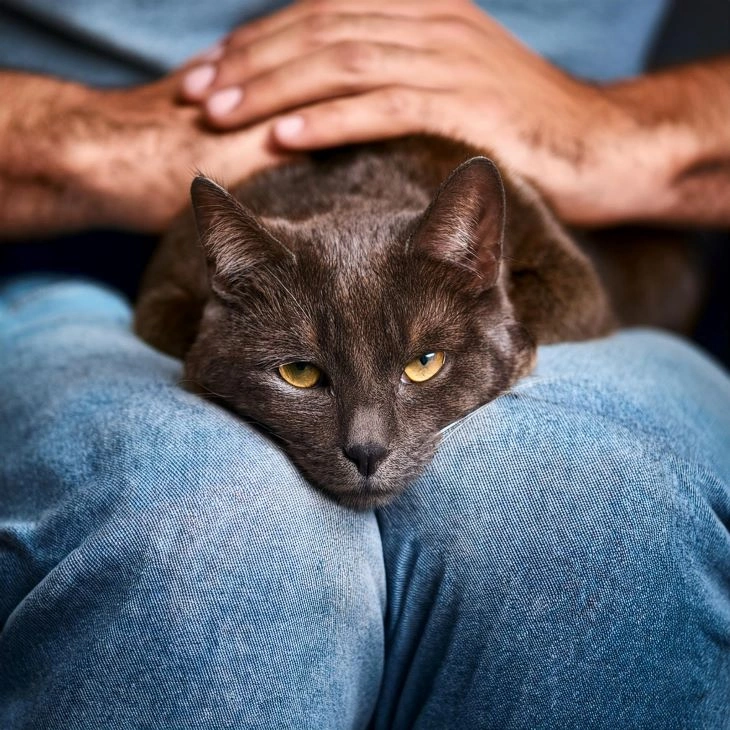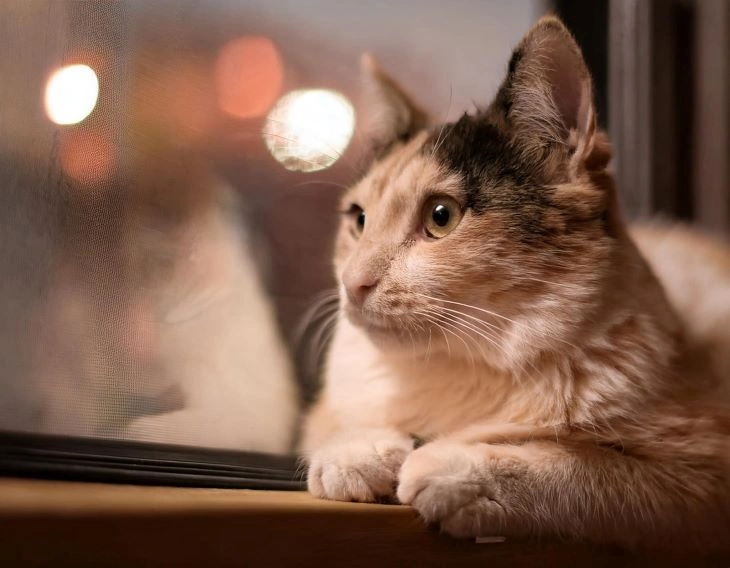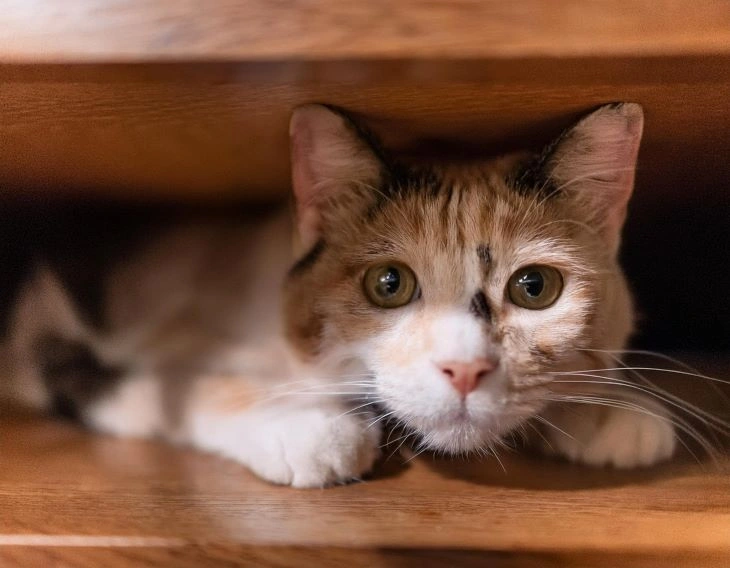Is Your Cat Stressed? Spot The Symptoms & Learn Effective Management Tips
By: Elizabeth Rikas

The information in this article is intended to educate cat parents and is not a substitute for veterinary guidance. In case of any concerns about your cat’s health, please talk with your veterinarian.
Cats are experts in hiding their emotions, making it a challenge to determine when they’re stressed. Stress in cats can be due to various factors, including environmental changes, health issues, or interactions with other pets. Recognizing these signs is essential to ensure your feline friend’s well-being. In this article we will discuss the most common causes, signs, and solutions for managing stress in cats, helping you create a more comfortable environment for them.
Related: Whisker Fatigue In Cats?
What Causes Stress in Cats?

Understanding the common causes of stress in cats is essential for every cat owner. Your furry friend may not always show it, but stress can significantly affect their health and happiness. Being aware of what factors contribute to your cat’s anxiety can help you create a calming environment. When stressed, they often exhibit a range of signs including:
- Changes in Environment
- Health Issues
- Social Interactions
- Lack of Simulation
- Inadequate Litter Box Conditions
- Stress from Other Pets
1. Changes in Environment
Cats are creatures of habit. They thrive in familiar surroundings. When there are changes in their environment, such as moving to a new home, renovations, or even new furniture, it can create significant stress. These changes disrupt their routine and may overwhelm them.
Key Environmental Changes Include:
- Moving to a new home
- Adding new furniture or decor
- Changes in the household, like a new pet or family member
- Loud noises from construction or neighbors
- Changes in your routine, like working from home
2. Health Issues
Sometimes stress in cats can stem from underlying health issues. If your cat is suddenly stressed, it is vital to consider whether they might be experiencing pain or discomfort related to an illness or injury. It’s best to consult your veterinarian if you notice any changes in behavior.
Potential Health Issues to Look Out For:
- Dental disease
- Arthritis or joint pain
- Gastrointestinal problems
- Infections or fevers
- Chronic illnesses
3. Social Interactions
Social dynamics can impact your cat’s mental well-being. Cats may feel stressed if they are not getting enough attention or if they are facing difficulties in socializing. Sudden changes in the social structure of a home, such as introducing a new pet or the loss of a companion, can leave a cat feeling anxious.
Social Situations That Can Cause Stress:
- Introducing new pets
- Loss of a companion animal
- Increased interactions from children
- Frequent visitors or large gatherings
4. Lack of Stimulation
Cats need mental and physical stimulation to stay happy. If they are bored or do not have enough outlets for their energy, it can lead to stress and even behavioral issues. Ensure your cat has toys, scratching posts, and opportunities to interact with their environment.
Ways to Provide Stimulation:
- Interactive toys that challenge their mind
- Cat trees or shelves for climbing
- Regular playtime with you
- Window perches for bird watching
5. Inadequate Litter Box Conditions
Believe it or not, a dirty litter box can truly stress your cat out. They are clean animals and prefer to have a clean place for their bathroom needs. If the litter box isn’t cleaned regularly or if they dislike the type of litter used, they’ll be hesitant to use it, which can lead to stress and potential health issues.
Factors Regarding Litter Box Setup:
- Not cleaning the litter box often enough
- Using a type of litter your cat dislikes
- Having an inadequate number of litter boxes
- Not providing a quiet place for the litter box
6. Stress from Other Pets
If you have multiple pets, your cat may feel the strain of competition for attention, food, or territory. This can lead to a stressful environment for them. Sometimes, a dominant pet can make a more timid cat feel anxious. Observing their interactions can help you figure out what the issues might be.
Signs of Stress Related to Other Pets:
- Hiding more than usual
- Aggressive behavior towards other pets
- Changes in eating habits
- Marking territory inside the home
Also Read: 7 Annoying Sounds Cat Hate?
Cat Stress – Signs To Look Out For
Recognizing stress in cats requires observing their behavior and body language closely. Here are the primary indicators:

Changes in Behavior
When your cat is stressed, you might notice some significant changes in their usual behavior. These can include:
- Hiding: If your once social cat prefers to stay in secluded areas and avoids interaction, this may signal stress.
- Over-Grooming: Cats often groom themselves as a way to cope. If you see bald patches or excessive grooming, it could be a sign of stress.
- Aggression: Sudden aggression towards people or other pets can indicate that your cat is feeling threatened or anxious.
- Increased Vocalization: If your cat starts meowing more than usual, it may be expressing its discomfort or distress.
Also Read: Why Cats Can’t Come Down From Trees?
Changes in Eating Habits
Monitor your cat’s eating habits closely. Stress can lead to changes in appetite. Some cats may stop eating altogether, while others might eat more as a comfort mechanism. Look out for the following:
- Refusing Food: If your cat suddenly turns its nose up at their favorite meals, it’s time to investigate further.
- Eating Excessively: On the other hand, binge eating can also be a sign of stress and emotional turmoil.
Also Read: Why Do Cats Gag?
Physical Signs of Stress
Healthcare plays an integral role in monitoring your cat’s physical condition, as stress can manifest physically. Be on the lookout for:
- Changes in Litter Box Behavior: A stressed cat might stop using the litter box or may have accidents outside of it.
- Pacing or Restlessness: If your cat seems unable to settle down or is pacing back and forth, this can be a red flag.
- Excessive Scratching: More frequent scratching on furniture or other surfaces may signify anxiety or irritation.
Environmental Triggers
If you suspect your cat is stressed, consider what might be causing it. Cats are sensitive creatures and can easily become uneasy due to changes in their environment. Some common triggers include:
- New Pets or People: Introducing a new pet or having visitors can disrupt your cat’s sense of security.
- Moving to a New Home: A change in location can be overwhelming for cats, as they rely heavily on familiar scents and surroundings.
- Loud Noises: Fireworks, thunder, or even loud parties can frighten your cat and induce stress.
Also Read: Why Does My Cat Snore?
How To Help A Stressed Cat

Preventing and managing stress in cats is critical for their overall health. Here are some practical strategies you can implement to care about it:
- Provide Safe Spaces: Create quiet, cozy spaces where your cat can retreat when they feel overwhelmed. This helps them feel secure.
- Routine Maintenance: Stick to a daily routine for feeding, play, and grooming. Consistency can help reduce anxiety.
- Interactive Play: Engage your cat in regular play sessions to relieve stress and build a stronger bond.
- Environmental Enrichment: Provide toys, scratching posts, and climbing structures to keep your cat stimulated and entertained.
- Consult a Veterinarian: If your cat shows severe stress signs, a vet can offer advice or treatment options.
Also Read: Why Cats Can’t Get Down From Trees?
The Importance Of A Stress-Free Environment for Your Cat
Caring for your cat involves more than providing food and shelter; it also requires creating an environment where your feline friend can thrive. A stress-free environment is crucial for your cat’s overall well-being. Just like humans, cats can experience stress, which can affect their behavior and health. Understanding the elements of a calming space will help you ensure your cat feels secure and happy.
Recognizing Stressors
To create a comfortable environment, you need to identify what stresses your cat. Common stressors include changes in routine, loud noises, or the introduction of new pets. Some signs your cat is stressed may include:
- Hiding more than usual
- Changes in appetite
- Excessive grooming or meowing
- Aggressive behavior or withdrawal
By being aware of these signs, you can take proactive steps to minimize stressors in your cat’s life.
Providing a Safe Space
Every cat needs a safe zone where they can retreat and feel secure. Designate a quiet area in your home where your cat can go when they feel overwhelmed. Provide cozy blankets and a few favorite toys in this space to make it inviting. This area should be free from disturbances such as loud noises or the commotion of family life.
Maintaining a Routine
Cats thrive on routine because it helps them know what to expect in their daily lives. A consistent feeding schedule and regular playtime can provide comfort and stability. Try to feed your cat at the same times each day, and establish a routine for grooming and play. A predictable schedule helps your cat feel safe and reduces anxiety.
Enhancing the Environment
Enhancing your cat’s environment can also help reduce stress. Consider the following strategies:
- Vertical Space: Cats love to climb! Providing cat trees or shelves gives them places to explore and feel secure.
- Interactive Toys: Providing toys that stimulate your cat’s mind keeps them engaged and reduces boredom.
- Safe Hiding Spots: Ensure there are boxes, cat tunnels, or hides where your cat can retreat if they need some alone time.
Avoiding Conflicts
If you have multiple pets, conflicts may arise that can stress your cat. Monitor interactions, especially during meal times or when introducing new pets. Gradually introduce new animals into your home to avoid overwhelming your cat. It might take time, but careful introductions can help maintain peace and harmony.
Related: Do Cats Get Jealous?
Using Calming Products
In addition to environmental changes, you may want to consider using products designed to de-stress your cat. Calming collars, pheromone diffusers, or sprays can create a soothing atmosphere. These products mimic natural pheromones, which can help alleviate anxiety and create a sense of safety.
Related: Why Do Cats Love Catnip?
Regular Vet Visits
Don’t neglect to schedule regular veterinary check-ups for your cat. Health problems can lead to stress. If you notice any sudden behavior changes or stress symptoms, consult your veterinarian. They can help rule out medical conditions that might be causing your cat’s anxiety and recommend ways to mitigate stress levels.
Engaging with Your Cat
Spending quality time with your cat can also reduce stress. Interactive play can strengthen your bond while providing exercise, which is important for a healthy lifestyle. Use various toys that encourage your cat to chase and pounce, simulating their natural hunting instincts.
Interesting Read: Why does my cat sleep between my legs?
Frequently Asked Questions
Final Thoughts
Your cat’s well-being hinges on your ability to recognize the signs of stress. By recognizing the causes, observing their behavior, and taking proactive measures, you can help your cat lead a happy and stress-free life. Whether through environmental enrichment, maintaining routines, or seeking veterinary guidance, every effort counts toward ensuring your feline friend feels safe and loved.

About the Author
Elizabeth Rikas
Elizabeth is a passionate advocate for feline health and well-being, drawing from her years as a dedicated pet parent to three cats—Gypsy, Swan, and Alfred—and her invaluable experience volunteering at animal shelters. A seasoned writer with a lifelong love for cats, Elizabeth began sharing her insights in her teens and has since contributed extensively to platforms focused on feline care. Through her expertise and heartfelt dedication, she empowers pet owners with practical advice and research-backed knowledge to nurture their furry companions.
